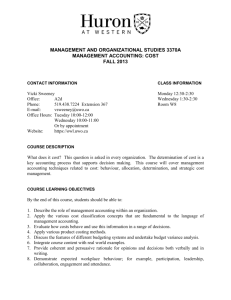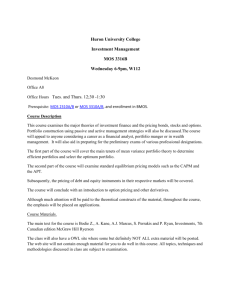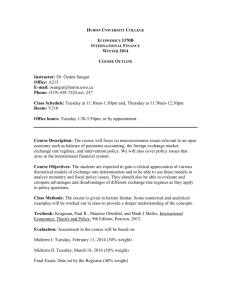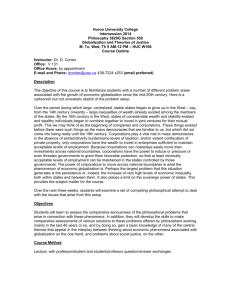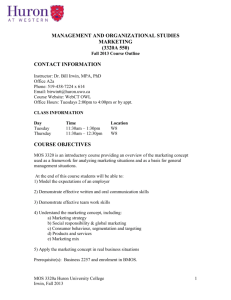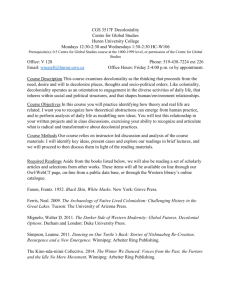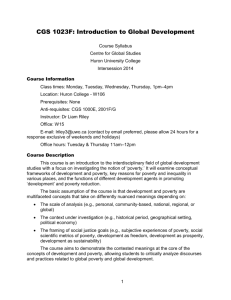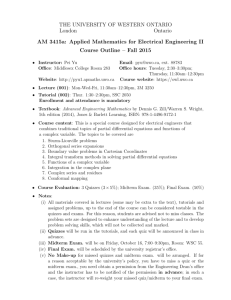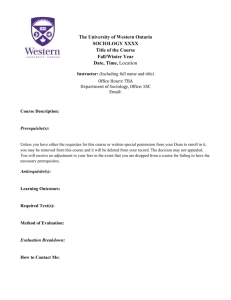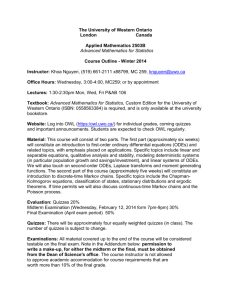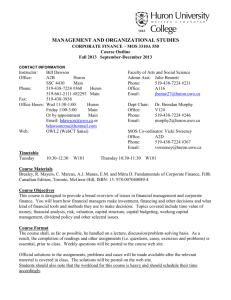mos 2155b 550 - Huron University College
advertisement
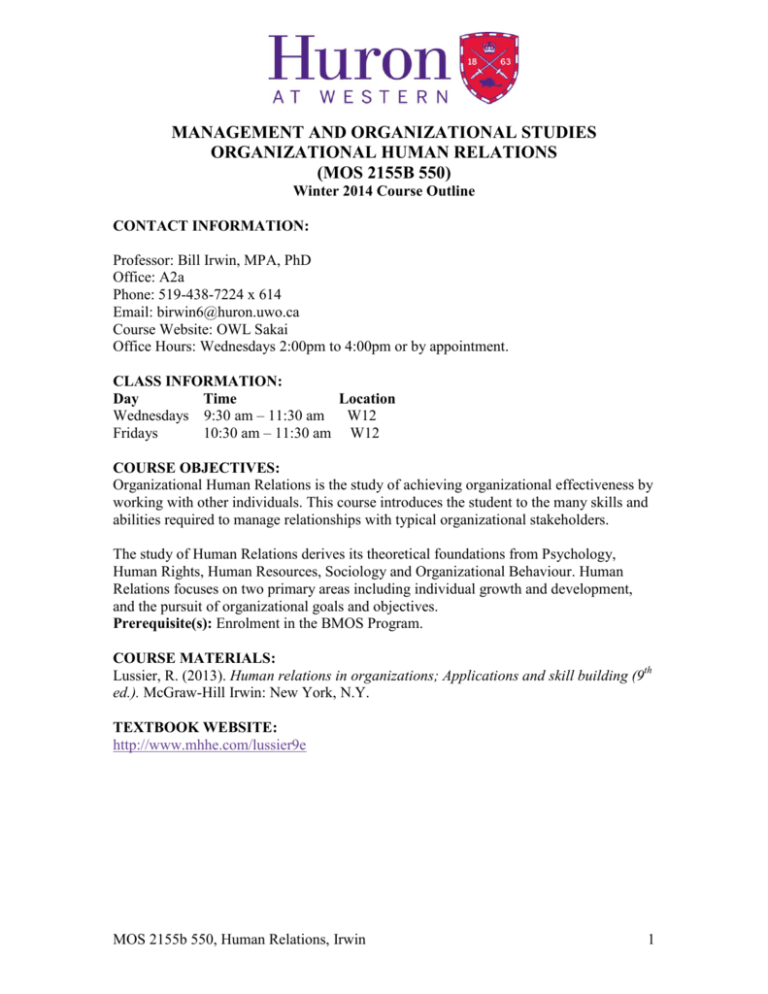
MANAGEMENT AND ORGANIZATIONAL STUDIES ORGANIZATIONAL HUMAN RELATIONS (MOS 2155B 550) Winter 2014 Course Outline CONTACT INFORMATION: Professor: Bill Irwin, MPA, PhD Office: A2a Phone: 519-438-7224 x 614 Email: birwin6@huron.uwo.ca Course Website: OWL Sakai Office Hours: Wednesdays 2:00pm to 4:00pm or by appointment. CLASS INFORMATION: Day Time Location Wednesdays 9:30 am – 11:30 am W12 Fridays 10:30 am – 11:30 am W12 COURSE OBJECTIVES: Organizational Human Relations is the study of achieving organizational effectiveness by working with other individuals. This course introduces the student to the many skills and abilities required to manage relationships with typical organizational stakeholders. The study of Human Relations derives its theoretical foundations from Psychology, Human Rights, Human Resources, Sociology and Organizational Behaviour. Human Relations focuses on two primary areas including individual growth and development, and the pursuit of organizational goals and objectives. Prerequisite(s): Enrolment in the BMOS Program. COURSE MATERIALS: Lussier, R. (2013). Human relations in organizations; Applications and skill building (9th ed.). McGraw-Hill Irwin: New York, N.Y. TEXTBOOK WEBSITE: http://www.mhhe.com/lussier9e MOS 2155b 550, Human Relations, Irwin 1 COURSE EXPECTATIONS: 1. Attendance: Students are expected to attend all classes. 2. Preparation: Assigned materials (text, readings and cases) should be prepared prior to class. 3. Contribution: Individual contributions may consist of: responding to questions; summarizing key concepts; analyzing case details; presenting relevant outside references; posing questions; or otherwise enriching the learning experience in the class. 4. Group work: Groups will be formed during the first week of classes. These groups will work together on the group presentation and on some in-class activities. The group is expected to manage all of its organizational and work assignment tasks with fairness and respect. The instructor will be happy to mediate issues as long as assistance is requested in a timely manner EVALUATION: Evaluation Mid-term Presentation Case Study Final Exam In Class Activities Total Percentage 30% 20% 40% 10% 100% Date/Time/Location Feb. 26 April 2/4 Chapters 1 to 7 TBA Final Exam Period TBA Every Class 8 to 13 All Chapters MIDTERM: There is one midterm in this course, worth 30% held on Feb. 26. As above, the midterm will cover chapters 1to 8. The midterm may consist of various types of questions such as multiple choice, short answer or essay questions. The midterm will be written in class and will be 1 hour and 50 minutes in length. Students are only allowed to bring writing instruments to the exam; no books, calculators, dictionaries, cell phones etc. are allowed. Students are responsible for all material covered in class as well as the assigned chapters in the text. All students are required to complete the midterm in this course as a mandatory course requirement. GROUP PRESENTATION/ CASE STUDY: The group presentation serves a variety of purposes and it is worth 20% of the final mark. First, it allows the student to apply the concepts discussed in the course to an organization. It will also develop and strengthen the students’ skills in human relations. Additional information will be distributed prior to Reading Week. MOS 2155b 550, Human Relations, Irwin 2 Each group will present its analysis during the last two classes of the term on April 2nd and 4th. Each member of the group should actively participate in the presentation. Failure to participate in the presentation will result in a grade of zero for the presentation. All students are expected to attend during these two presentation classes and ask relevant questions. The presentation will be judged on the clarity of the group’s analysis, the creativity and the structure of the group’s presentation, and its ability to respond to questions. Peer evaluation tools will be used to supplement the instructor’s assessment as a way to fairly assess the equal contribution of all group members. FINAL EXAM: The final exam is held during the April exam period. As above, the final exam will cover chapters 9 to 13. The final exam may consist of various types of questions such as multiple choice, fill-in-the-blanks and short answer or essay questions. The final exam will be 3 hours in length and is worth 40% of the course evaluation. Students are only allowed to bring writing instruments to the exam; no books, calculators, dictionaries, cell phones etc. are allowed. Students are responsible for all material covered in class as well as the assigned chapters in the text. All students are required to complete the final exam in this course as a mandatory course requirement. IN-CLASS ACTIVITIES: In-class activities will be administered throughout the course as a practical way of applying Human Relations theory. Students will work in groups of 4-5 members and submit one solution to the activity. In-class activities are worth 10% of the student’s final mark. MOS 2155b 550, Human Relations, Irwin 3 CLASS SCHEDULE: Week Of: Jan. 8/10 Jan. 15/17 Jan. 22/24 Jan. 29/31 Feb. 5/7 Feb. 12/14 Feb. 19/21 Feb. 26 Feb. 28 Mar. 5/7 Mar. 12/14 Mar. 19/21 Mar. 26/28 April 2/4 T.B.A Topic Understanding Human Behaviour Personality, Stress and Learning Attitudes, Self-Concept, Values and Ethics Time and Career Management Communications, Emotions and Criticism Dealing with Conflict Leading AND Trust READING WEEK – NO CLASSES MIDTERM EXAM Motivating Performance Ethical Power, Politics, Etiquette Networking and Negotiating Team Dynamics and Creative Problem Solving Organizational change and Culture Valuing Diversity Globally Final Exam - Final Exam Period MOS 2155b 550, Human Relations, Irwin Chapter(s) 1, 2 3 4 5 6 7 1,2,3,4,5,6,7 8 9 10 11 12 13 10,11,13,15,17,18 4 Appendix to Course Outlines Prerequisite Information Students are responsible for ensuring that they have successfully completed all course prerequisites. Unless you have either the requisites for this course or written special permission from your Dean to enrol in it, you may be removed from this course and it will be deleted from your record. This decision may not be appealed. You will receive no adjustment to your fees in the event that you are dropped from a course for failing to have the necessary prerequisites. Conduct of Students in Classes, Lectures, and Seminars Membership in the community of Huron University College and the University of Western Ontario implies acceptance by every student of the principle of respect for the rights, responsibilities, dignity and well-being of others and a readiness to support an environment conducive to the intellectual and personal growth of all who study, work and live within it. Upon registration, students assume the responsibilities that such registration entails. The academic and social privileges granted to each student are conditional upon the fulfillment of these responsibilities. In the classroom, students are expected to behave in a manner that supports the learning environment of others. Students can avoid any unnecessary disruption of the class by arriving in sufficient time to be seated and ready for the start of the class, by remaining silent while the professor is speaking or another student has the floor, and by taking care of personal needs prior to the start of class. If a student is late, or knows that he/she will have to leave class early, be courteous: sit in an aisle seat and enter and leave quietly. Please see the Code of Student Rights and Responsibilities at: http://www.huronuc.ca/CurrentStudents/StudentLifeandSupportServices/StudentD iscipline Technology It is not appropriate to use technology (such as, but not limited to, laptops, PDAs, cell phones) in the classroom for non-classroom activities. Such activity is disruptive and is distracting to other students and to the instructor, and can inhibit learning. Students are expected to respect the classroom environment and to refrain from inappropriate use of technology and other electronic devices in class. Academic Accommodation for Medical/Non-Medical Grounds For UWO Policy on Accommodation for Medical Illness and a downloadable SMC see: http://www.uwo.ca/univsec/pdf/academic_policies/appeals/accommodation_medi cal.pdf [downloadable Student Medical Certificate (SMC): https://studentservices.uwo.ca under the Medical Documentation heading] Students seeking academic accommodation on medical grounds for any missed tests, exams, participation components and/or assignments worth 10% or more of their final grade must apply to the Academic Counselling office of their home Faculty and MOS 2155b 550, Human Relations, Irwin 5 provide documentation. Academic accommodation will be determined by the Dean’s Office in consultation with the instructor. For non-medical grounds or for medical grounds when work represents less than 10% of the overall grade for the course, students seeking academic accommodation must apply to the Academic Counselling office of their home Faculty and provide documentation. Academic accommodation will be determined by the Dean’s Office in consultation with the instructor. Statement on Academic Offences Scholastic offences are taken seriously and students are directed to read the appropriate policy, specifically, the definition of what constitutes a Scholastic Offence, at the following Web site: http://www.uwo.ca/univsec/pdf/academic_policies/appeals/scholastic_discipline_ undergrad.pdf Statement on Academic Integrity The International Centre for Academic Integrity defines academic integrity as "a commitment, even in the face of adversity, to five fundamental values: honesty, trust, fairness, respect, and responsibility. From these values flow principles of behaviour that enable academic communities to translate ideals to action." (CAI Fundamental Values Project, 1999). A lack of academic integrity is indicated by such behaviours as the following: Cheating on tests; Fraudulent submissions online; Plagiarism in papers submitted (including failure to cite and piecing together unattributed sources); Unauthorized resubmission of course work to a different course; Helping someone else cheat; Unauthorized collaboration; Fabrication of results or sources; Purchasing work and representing it as one’s own. Academic Integrity: Importance and Impact Being at university means engaging with a variety of communities in the pursuit and sharing of knowledge and understanding in ways that are clear, respectful, efficient, and productive. University communities have established norms of academic integrity to ensure responsible, honest, and ethical behavior in the academic work of the university, which is best done when sources of ideas are properly and fully acknowledged and when responsibility for ideas is fully and accurately represented. In the academic sphere, unacknowledged use of another’s work or ideas is not only an offence against the community of scholars and an obstacle to academic productivity. It may also be understood as fraud and may constitute an infringement of legal copyright. A university is a place for fulfilling one's potential and challenging oneself, and this MOS 2155b 550, Human Relations, Irwin 6 means rising to challenges rather than finding ways around them. The achievements in an individual’s university studies can only be fairly evaluated quantitatively through true and honest representation of the actual learning done by the student. Equity in assessment for all students is ensured through fair representation of the efforts by each. Acting with integrity at university constitutes a good set of practices for maintaining integrity in later life. Offences against academic integrity are therefore taken very seriously as part of the university’s work in preparing students to serve, lead, and innovate in the world at large. A university degree is a significant investment of an individual’s, and the public’s, time, energies, and resources in the future, and habits of academic integrity protect that investment by preserving the university’s reputation and ensuring public confidence in higher education. Students found guilty of plagiarism will suffer consequences ranging from a grade reduction to failure in the course to expulsion from the university. In addition, a formal letter documenting the offence will be filed in the Dean’s Office, and this record of the offence will be retained in the Dean’s Office for the duration of the student’s academic career at Huron University College. All required papers may be subject to submission for textual similarity review to the commercial plagiarism detection software under license to the University for the detection of plagiarism. All papers submitted for such checking will be included as source documents in the reference database for the purpose of detecting plagiarism of papers subsequently submitted to the system. Use of the service is subject to the licensing agreement, currently between The University of Western Ontario and Turnitin.com. Computer-marked multiple-choice tests and/or exams may be subject to submission for similarity review by software that will check for unusual coincidences in answer patterns that may indicate cheating. Personal Response Systems (“clickers”) may be used in some classes. If clickers are to be used in a class, it is the responsibility of the student to ensure that the device is activated and functional. Students must see their instructor if they have any concerns about whether the clicker is malfunctioning. Students must use only their own clicker. If clicker records are used to compute a portion of the course grade: the use of somebody else’s clicker in class constitutes a scholastic offence, the possession of a clicker belonging to another student will be interpreted as an attempt to commit a scholastic offence. Policy on Special Needs Students who require special accommodation for tests and/or other course components must make the appropriate arrangements with the Student Development Centre (SDC). Further details concerning policies and procedures may MOS 2155b 550, Human Relations, Irwin 7 be found at: http://www.sdc.uwo.ca/ssd/?requesting_acc Attendance Regulations for Examinations A student is entitled to be examined in courses in which registration is maintained, subject to the following limitations: 1) A student may be debarred from writing the final examination for failure to maintain satisfactory academic standing throughout the year. 2) Any student who, in the opinion of the instructor, is absent too frequently from class or laboratory periods in any course will be reported to the Dean of the Faculty offering the course (after due warning has been given). On the recommendation of the Department concerned, and with the permission of the Dean of that Faculty, the student will be debarred from taking the regular examination in the course. The Dean of the Faculty offering the course will communicate that decision to the Dean of the Faculty of registration. Class Cancellations In the event of a cancellation of class, every effort will be made to post that information on the Huron website, http://www.huronuc.ca/AccessibilityInfo (“Class Cancellations”). Accessibility Huron University College strives at all times to provide its goods and services in a way that respects the dignity and independence of people with disabilities. We are also committed to giving people with disabilities the same opportunity to access our goods and services and allowing them to benefit from the same services, in the same place as, and in a similar way to, other customers. We welcome your feedback about accessibility at Huron. Information about how to provide feedback is available at: http://www.huronuc.ca/AccessibilityInfo Mental Health @ Western Students who are in emotional/mental distress should refer to Mental Health @ Western http://www.uwo.ca/uwocom/mentalhealth/ for a complete list of options about how to obtain help. Program and Academic Counselling MOS students registered at Huron who require advice about modules and courses in MOS should contact Vicki Sweeney, Director, Management and Organizational Studies, vsweeney@huron.uwo.ca, 519-438-7224 ext. 367. Students should contact Academic Counselling on other academic matters. See the Academic Counselling website for information on services offered. http://huronuc.ca/CurrentStudents/StudentLifeandSupportServices/CounselorsCou nsellingServices MOS 2155b 550, Human Relations, Irwin 8
